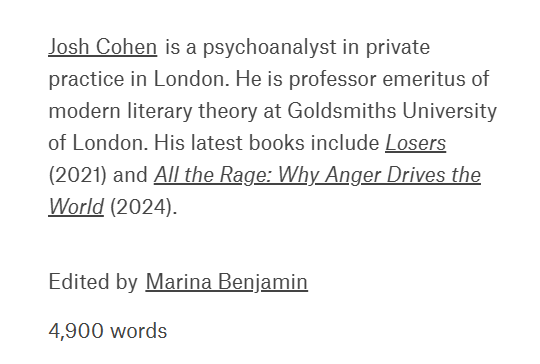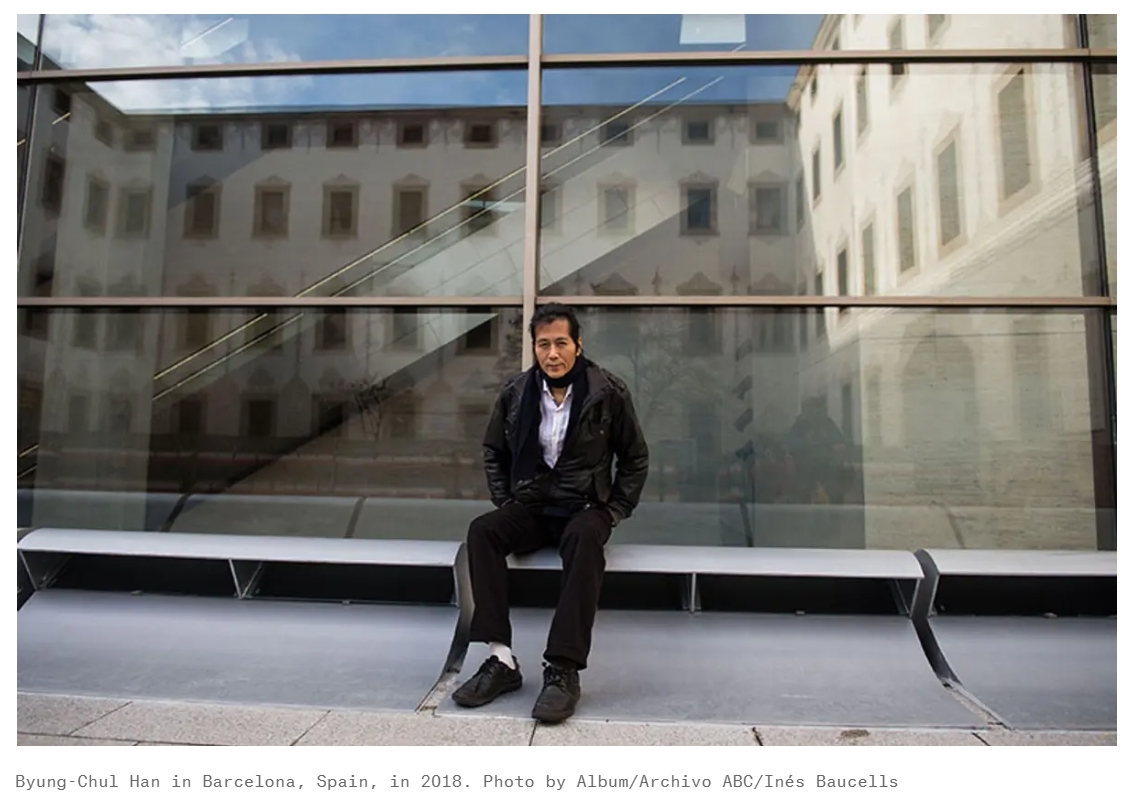Welcome to DU!
The truly grassroots left-of-center political community where regular people, not algorithms, drive the discussions and set the standards.
Join the community:
Create a free account
Support DU (and get rid of ads!):
Become a Star Member
Latest Breaking News
Editorials & Other Articles
General Discussion
The DU Lounge
All Forums
Issue Forums
Culture Forums
Alliance Forums
Region Forums
Support Forums
Help & Search
The winter of civilisation

Byung-Chul Han’s relentless critiques of digital capitalism reveal how this suffocating system creates hollowed-out lives
https://aeon.co/essays/thought-tinkering-the-korean-german-philosopher-byung-chul-han


I came across Byung-Chul Han towards the end of the previous decade, while writing a book about the pleasures and discontents of inactivity. My first researches into our culture of overwork and perpetual stimulation soon turned up Han’s The Burnout Society, first published in German in 2010. Han’s descriptions of neoliberalism’s culture of exhaustion hit me with that rare but unmistakable alloy of gratitude and resentment aroused when someone else’s thinking gives precise and fully formed expression to one’s own fumbling intuitions.

At the heart of Han’s conception of a burnout society (Müdigkeitsgesellschaft) is a new paradigm of domination. The industrial society’s worker internalises the imperative to work harder in the form of superego guilt. Sigmund Freud’s superego, a hostile overseer persecuting us from within, comes into being when the infantile psyche internalises the forbidding parent. In other words, the superego has its origin in figures external to us, so that, when it tells us what to do, it is as though we are hearing an order from someone else. The achievement society of our time, Han argues, runs not on superego guilt but ego-ideal positivity – not from a ‘you must’ but a ‘you can’. The ego-ideal is that image of our own perfection once reflected to our infantile selves by our parents’ adoring gaze. It lives in us not as a persecutory other but as a kind of higher version of oneself, a voice of relentless encouragement to do and be more.

With this triumph of positivity, the roughness of the demanding boss gives way to the smoothness (a key Han term) of the relentlessly encouraging coach. On this view, depression is the definitive malaise of the achievement society: the effect of being always made to feel that we’re running hopelessly behind our own ego-ideal, exhausting ourselves in the process. The figure of the achievement subject gives rise to some of Han’s most vivid evocations of psychic and bodily debilitation:
Reading this passage now, I recall how startlingly true it seemed to me on first reading. It sent me back to the early years of my professional academic life, the permanent background hum of anxious frustration, as research – at once the first and the most distant professional priority, the job’s one indisputable signal of achievement – was forever subordinated to the workaday demands of teaching, marking and committee meetings. In the scarce hours outside of those duties, I’d return to work on an article and quickly realise that I needed to comb a dozen more sources before I could begin to write it. Abruptly, I became aware of how tired I was; able neither to work nor refrain from it, I’d lie suspended in a state of weary wakefulness. That hollowed-out achievement self, ‘at war with itself’, was all too familiar.
snip
1 replies
 = new reply since forum marked as read
Highlight:
NoneDon't highlight anything
5 newestHighlight 5 most recent replies
= new reply since forum marked as read
Highlight:
NoneDon't highlight anything
5 newestHighlight 5 most recent replies
The winter of civilisation (Original Post)
Celerity
Feb 28
OP
slightlv
(5,425 posts)1. Mine made itself known at retirement.
The constant feeling I was wasting time... that I should be doing *something* productive. I should be working towards making a mark... a change in the world for the better. But never having enough strength, drive, and motivation to figure out how and what. Little moves didn't last too long. Big ideas slipped behind the knowledge of no money to set them in motion (and in fact, they'd probably have died, too).
"At war with itself" is a constant battle for me. And yes, I'm on anti-depressants (plural) and anti-anxiety meds. Still looking for that special combo that will bring me peace, and knowing that it's never going to be found outside, but within me, myself. And so, I continue the war.
